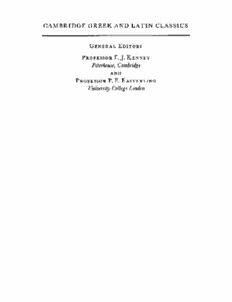
Lucan: De bello civili Book II PDF
Preview Lucan: De bello civili Book II
INTRODUCTION 1. DE BELLO CIVILI: THE POET AND THE POEM The De hello civili1 of M. Annaeus Lucanus was composed in less than six years, between the young man's recall from Athens at the invitation of the Emperor Nero, his near contemporary, in A.D. 59 and his death by his own hand on 30 March A.D. 65. All that we know about his brief career is drawn from notices in Tacitus, from Statius' Genethliacon Lucani2 and from two ancient lives preserved in several early manu- scripts of the De hello civilly one composed by Suetonius for his set of poets' lives in the lost work De viris illustribus, the other attributed to Vacca, a grammarian of uncertain date - perhaps the sixth century.3 Lucan was brought up under the influence of his uncle M. Annaeus Seneca, and trained in both rhetoric and Stoic philosophy, which he studied with Annaeus Cornutus.4 On his return from Athens Lucan became one of Nero's official cohors amicorum and received a quaestorship ahead of his age.5 At Nero's new cultural festival, the JVeronia of A.D. 60, the poet won public acclaim for his encomium of the Emperor (the 1 Both De bello civili (the title found in most manuscripts) and Bellum civile (as cited by Suetonius, Vita Lucani 5 and Vacca 58, 68) are used by modern editors as titles of Lucan's epic, but it was long known as Pharsalia, because scholars had construed Lucan 9.985-6 venturi me teque legent. Pharsalia nostra \ vivet, et a nullo tenebris damnabimur aevo, as a reference to his chosen title. See Ahl, Lucan 326- 42. 2 Silvae 2.7, written for Lucan's widow Polla Argentaria twenty years after the poet's death. For Polla, and the circumstances of the poem, see R. G. M. Nisbet, ' Felicitas at Surrentum', J.R.S. 68 (1978) 1-11. 3 For the texts with commentary see A. Rostagni, Suetonius: de poetis (Turin 1944, repr. Arno 1979) 142-9 (Suetonius; the beginning of this life is lost) and 178-86 (Vacca). 4 On Cornutus see Glenn W. Most,' Cornutus and Stoic allegoresis\ A.N.R. W. 11 36.3 (1989) 2014-65; for his influence on Lucan, 2053-6. 5 On the date of Lucan's quaestorship see Griffin, Nero 158, with notes. 1
